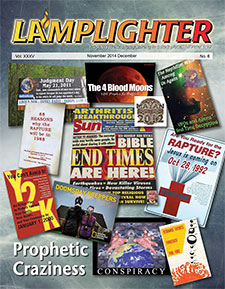The Tribal Theory of God
Does History Support It?

Does history in any way support a “Tribal Theory of God”? That’s the question once pondered by Dr. W. Mackintosh MacKay, former pastor of a church in Glasgow, Scotland. He defined Tribal Theory as “a belief that because God has blessed a country with material advantages for many years, He has a peculiar affection for that country and will never cast it off.”1
This is the foundational thinking for the present-day belief many Americans tie to the mantra “God Bless America.” It is the idea that since God’s blessings over the past decades haven’t stopped flowing, therefore the United States is extra special to Him and so must be invincible.
Those who ascribe to Tribal Theory are apt to point to various verses that promise a nation great material blessings. Though the verses are directed at ancient Israel, adherents feel the blessings can be transferred to any nation.
Favorite verses are Malachi 3:10 where God declares, “see if I will not open for you the windows of heaven and pour out for you such blessing that there will not be room enough to receive it.” God in Exodus 15:26 promises the blessings of health. Exodus 19:5 promises the nation that they shall be a special treasure to God. In Exodus 23:22, God will be the great national protector who serves as “an enemy to your enemies.” God in Leviticus 26 promises boundless crops, removal of wild animals, an undefeatable army, and a fruitful population. And, according to Exodus 20:6, the blessings will flow down for thousands of generations, or in other words, they’ll be unlimited practically forever.
God does indeed grant abundant favors to His children, but there are often overlooked caveats to these promises. To receive the blessings of Malachi 3:10, the Lord challenges the nation to “bring all the tithes into the storehouse that there may be food in my house.” To receive the health of Exodus 15:26, God expects the people to, “diligently heed the voice of the Lord your God and do what is right in His sight.” To be treasured in Exodus 19:5, Israel has to “obey My voice and keep My covenant.” For God to be the protector of Exodus 23:22, the people have to “obey His voice and do all that I speak.” Totally overlooked from Leviticus 26 is where God warns that if they “despise My statutes” and “break My covenant” that horrible calamities will ensue, including national destruction by exile. And, the blessings of Exodus 20:6 actually only last three to four generations if the people no longer “love Me and keep My commandments.” Made abundantly clear, the promises of national blessings from God are conditional in nature, requiring the people’s continuing faith in God and obedience to His commands.
A strange response happens after those nations who initially meet God’s requirements are then showered with blessings. Humans just don’t behave very well once they receive them. Periods of unusual prosperity inevitably lead to spiritual complacency and ethical laxity. This is a curious thing about our fallen human nature. As we are blessed, instead of becoming more thankful to God and more generous towards others, we oddly enough become more thankless and self-centered. Love is replaced by greed, and indifference to everything else, other than self, swiftly follows. The cultured hearts of those blessed transform into calloused hearts. One commentator has described it this way: “They can talk learnedly of art, commerce, business, patriotism, religion and politics, but not the slightest concern is felt or expressed concerning the real woes, the real dangers, the real sores of the people.”2
The sin born of blessings is ultimately the love of self. Well-fed and well-dressed men and women adopt a “spirit of self-sufficiency and smug complacency.” They “thrive on material prosperity” while “idolatry, hypocrisy, moral corruption, and social injustices are everywhere.”3 True faith is expressed through action (James 2:17), but when the peoples’ actions are nothing but cold, corrupt and unjust, there is no real faith in God anymore. No faith means an end to the blessings, a vital point the Old Testament prophets tried to pound into the hard-headed minds of their people.
No nation then is ever immune from being cast off by God. For pagan nations, they are judged by how they respect their own laws. For God’s Chosen People — the Jews — their knowledge of right and wrong through the Mosaic Law burdened them with an extra responsibility for their actions. They were judged based on their obedience to divine law. This also carries over to nations who today claim to have been founded on the Bible, for as author John Hunter warns, “A people who publicly proclaim ‘In God We Trust,’ who solemnly declare day after day ‘One nation under God’ are in great peril. We have seen that privilege brings responsibility.”4
Go study the time of the Minor Prophets and you’ll perceive that a remarkably frightening similarity exists between the affluent nations of today and Israel in the time before the first exile. We have become the unfaithful Israel of the prophets’ time whose people erroneously thought themselves to be invincible. Realizing that, our nation must seriously take God’s caveats to heart and abandon our false confidence in Tribal Theory. We must in faith embrace the fact that God is ultimately sovereign over the nations of the world and that our leaders are merely temporary stewards.
No national sin goes unnoticed or unpunished by the Omniscient One. While the righteousness of the nation ensures the blessings of God, the sins of the nation most assuredly ensures His judgment and curses. And, as the multitudes of extinct nations that litter the dustbin of history prove, God most certainly will cast off unfaithful nations.
References
1) MacKay, W. MacKintosh. The Goodly Fellowship of the Prophets (New York, NY: Richard R. Smith Inc. Publishers, 1929), p. 23.
2) Yates, Kyle M. Preaching From the Prophets, (Nashville, TN: Broadman Press, 1942), p. 50.
3) Jensen, Irving L. Minor Prophets of Israel (Chicago, IL: Moody Bible Institute, 1975), p. 45.
4) Hunter, John E. Major Truths from the Minor Prophets (Grand Rapids, MI: Zondervan Publishing House, 1977), p. 34.




